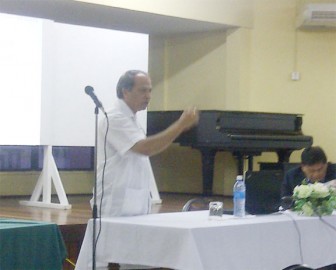To decrease the chances of developing diabetes, Profes-sor Jaipaul Singh says persons simply need to adapt to a healthier lifestyle by cutting their sugar intake level, maintaining a proper diet and exercising regularly.
These tips were given to the 45-50 persons who attended the public lecture ‘Diabetes Mellitus as a major global health problem: Research into understanding the long-term complications’ which was presented by Professor Singh, one of the four candidates short-listed for the position of Vice-Chancellor of the University of Guyana (UG). The lecture forms part of the assessment of the candidates. Pro Chan-cellor Prem Misir chaired the session. Dr Deen Sharma and other doctors were among those in attendance.
Singh was born at Uitvlugt and grew up at Windsor Forest, West Coast Demerara. He was educated at Uitvlugt Church of Scotland, St. Anthony’s Anglican, Windsor Forest, Indian Trust College and Queen’s College in Georgetown. He later attended UG where he acquired a BSc in 1971 and his Dip ED in 1972 before moving on to a teaching career. Singh left Guyana in 1974 for St Andrews University in Scotland and completed his BSc (Hons) in one year and his PhD in 1978. He then went on to complete his post doctoral research at St Andrews, Dundee and Liverpool universities.

In his presentation last Monday at the Education Lecture Theatre at the Turkeyen Campus, Professor Singh provided many tips to live longer and enjoy life. Among these were to avoid smoking and reduce alcohol intake; maintain normal blood pressure which is 120/80 mm Hg; keep a low cholesterol level; exercise at least 30 minutes daily; maintain a normal body mass; control sugar, fat and salt intake; and lower stress levels with yoga or meditation activities.
He also advised persons to eat four to five daily portions of fresh fruits and vegetables to protect the heart, eat only what the body needs, have regular medical check-ups and lastly, “don’t worry and be happy and enjoy life and be good to yourself.”
According to Singh, between 2011-2030 diabetes will rise to affect 450,000,000 people from the 250,000,000 it is currently affecting. He explained that in North America and Latin America, the figures are currently 25,000,000 and 15,000,000 respectively but are projected to double.
Similarly, in Oceana and Australia, the combined total of persons presently suffering from diabetes amounts to 4,000,000 but will increase to 8,000,000 by 2025. He said that in Europe, there is a 40,000,000 figure which is expected to escalate to 70,000,000 by 2025 and in Africa, the 16,000,000 total present is estimated to increase to 42,000,000. However, Asia tops the chart with a current 150,000,000 which is expected to rise to 250,000,000 by 2025.
According to Singh, the United Kingdom National Health Service provided a figure of £6 billion being spent annually to diagnose, treat and care for their 2.5 to 3 million diabetic patients. However, the total worldwide cost is £500 billion and is expected to rise to £900 billion by 2030. “This is one enormous financial burden for one disorder due to modern excesses and indulgences,” Professor Singh said.
Neuropathy which is the damage to and loss of nerve cells is among the long-term complications of the disease. This may cause a person suffering from diabetes to contract an infection if they are wounded but be unaware due to the loss of feeling. Retinopathy is also a long-term complication. This refers to damage to the retina in the eyes leading to cataract and blindness. Singh said that the kidneys become damaged as well due to excessive glucose filtration and this is referred to as nephropathy.
Cardiomyopathy, he continued, is the damage to the heart, blood vessels and cardiac cells while the heart muscle may become large and weak, making the organ unable to pump blood. According to the professor, around 70%-75% of diabetics will die from heart diseases while others will suffer from reduced digestive enzyme and tear secretion, foot ulcers, impotence, hyper-coagulation, etc.
Professor Singh has held the positions of lecturer, senior lecturer, principal lecturer, reader and professor of physiology.


